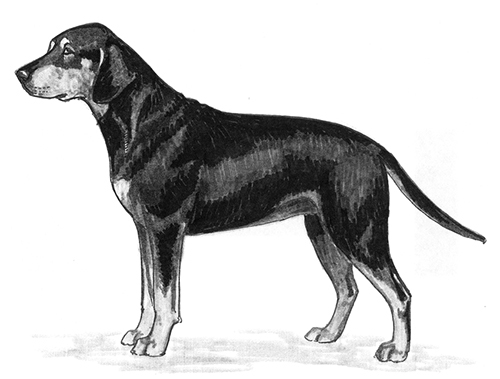Black Forest Hound (Slovakian Hound)
Scenthound Group
The goals and purposes of this breed standard include: to furnish guidelines for breeders who wish to maintain the quality of their breed and to improve it; to advance this breed to a state of similarity throughout the world; and to act as a guide for judges.
Breeders and judges have the responsibility to avoid any conditions or exaggerations that are detrimental to the health, welfare, essence and soundness of this breed, and must take the responsibility to see that these are not perpetuated.
Any departure from the following should be considered a fault, and the seriousness with which the fault should be regarded should be in exact proportion to its degree and its effect upon the health and welfare of the dog and on the dog’s ability to perform its traditional work.
History
The Black Forest Hound (also known as the Slovakian Hound) is an endurance trailing hound used on wild boar and predators.
The Black Forest Hound was recognized by the United Kennel Club in 2006.
General Appearance
A solid, yet lightly build, rectangular hound that is always solid black with tan markings.
Characteristics
The breed is spirited, and it has an extraordinarily well developed sense of direction.
Head
SKULL
The skull is a fairly long, rectangular shape. It is slightly domed. The frontal furrow is marked. There is no prominence of occiput. The stop is fairly abrupt.
MUZZLE
The muzzle is long and not too broad. The nasal bridge is straight, and lies in a plane that is parallel to the skull.
TEETH
The Black Forest Hound has a complete set of evenly spaced, white teeth meeting in a scissors bite.
Faults: Missing teeth. Overshot or undershot.
NOSE
The black nose is relatively large.
EYES
The deeply set eyes are almond shaped and dark, with a lively, courageous expression.
Faults: Light eyes, loose lids.
EARS
The ears are set above the line of the eye. They are medium length, have rounded tips and are carried flat against the cheeks.
Neck
Rather short and clean.
Forequarters
The shoulder blades and upper arms are rather short. They meet at an angle of 110 degrees.
FORELEGS
The legs are straight and dry. The pasterns are short and sloping.
Body
The body is somewhat longer than it is tall. The chest is deep and broad, with well developed forechest. The ribs are well sprung and slanting. The back is straight and medium long. The loin is broad, firm and muscular. The croup is rounded. There is moderate tuck-up.
Faults: Heavy, clumsy or stocky build. Soft back. Flat ribs.
Hindquarters
The angulation of the pelvis and femur is 130 degrees.
HIND LEGS
The thighs are long, broad and muscular. The angulation at the stifle is 130 degrees, and at the hock it is 150 degrees. The rear pasterns are moderately slanting.
Feet
Oval, with well arched toes and strong pads.
Tail
Set somewhat low, tapering to the tip and reaching to the hock, the tail is pendant in repose and carried in an upward curve but not above the back.
Coat
The outer coat is one to two inches long, medium coarse, close fitting and dense. The undercoat is dense, especially in winter.
Faults: Coat too short. Lack of undercoat. Coat too long. Wavy coat.
Color
Black with tan markings on the legs.
Faults: White markings. Unclear boundaries of tan markings.
Height and Weight
Height at the withers for males is 17.5 to 19.5 inches. For females, it is 15.5 to 17.5 inches.
Weight is 33 to 44 pounds.
Fault: Oversize.
Gait
Lively and balanced.
Disqualifications
(A dog with a Disqualification must not be considered for placement in a conformation event, and must be reported to UKC.)
Unilateral or bilateral cryptorchid.
Viciousness or extreme shyness.
Albinism.

Looking for a Dog?
Find a dog that will fit your family.
Note: The breeders on this list are not endorsed by UKC.
©Copyright 2006, United Kennel Club
